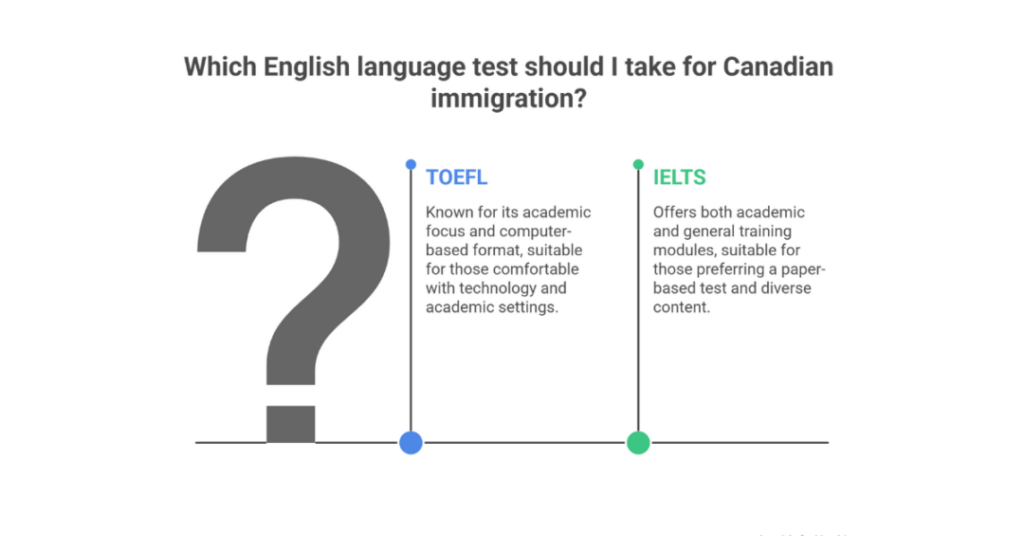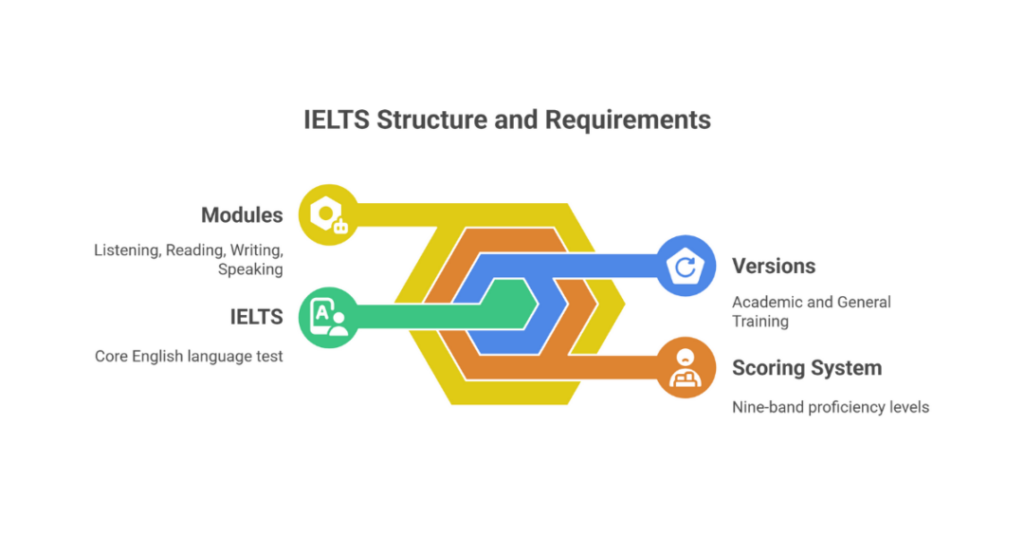23 August 2025
8 minutes read
Canada Immigration TOEFL or IELTS: A Complete Guide for Indian Students

Canada is a land of opportunity, known for its high-quality education, strong job market, and welcoming immigration policies. If you’re considering making Canada your new home through immigration for study or work, one crucial step is proving your English language proficiency.
Two of the most widely recognized English language tests for Canadian immigration are the Test of English as a Foreign Language (TOEFL) and the International English Language Testing System (IELTS).
In this comprehensive guide, we will look into these tests, providing you with all the information you need to make an informed choice for your immigration journey.
Why English Proficiency Tests Matter for Canada Immigration?
English proficiency tests are crucial for canada immigration TOEFL or ielts, helping test takers prove their english language skills for study in Canada, work visa, or permanent residence. The immigration department and refugees and citizenship require a secure test result from IELTS or TOEFL.
Whether through IELTS exam, IELTS on computer, TOEFL iBT and IELTS, or TOEFL Essentials test, applicants must meet Canadian Language Benchmark minimum score for study permit applications, economic immigration programs, and Canadian permanent resident pathways.
Canadian Immigration: TOEFL vs. IELTS
Canada’s immigration process often requires proof of your ability to communicate effectively in English. This language proficiency requirement is in place to ensure that newcomers can successfully integrate into Canadian society and the job market.

The two primary English language tests accepted for Canadian immigration are TOEFL and IELTS. In this section, we will explore the fundamental differences between these tests, their scoring systems, and the key considerations for choosing one over the other.
TOEFL – A Closer Look
TOEFL, or the Test of English as a Foreign Language, is a widely accepted English language proficiency test. It assesses your ability to read, listen, speak, and write in English, making it a comprehensive evaluation of your language skills. There are two main formats of TOEFL: the TOEFL iBT (internet-based test) and the TOEFL PBT (paper-based test).
The TOEFL iBT is the most commonly taken version and is favored for its convenience and accessibility. It is offered throughout the year at designated test centers and even provides an option for taking the test from the comfort of your home, thanks to the TOEFL iBT Home Edition.
TOEFL scores are based on a total of 120 points, with each section (Reading, Listening, Speaking, and Writing) contributing a maximum of 30 points. Achieving a high TOEFL score can significantly enhance your eligibility for Canadian immigration purposes, as it demonstrates a strong command of the English language.
TOEFL iBT vs. TOEFL PBT
The choice between the TOEFL iBT and TOEFL PBT often depends on test-takers’ preferences and location. Here’s a brief comparison of the two formats:
| Aspect | TOEFL iBT (Internet-Based Test) | TOEFL PBT (Paper-Based Test) |
|---|---|---|
| Test Delivery | Administered online via the internet. | Administered on paper with printed test booklets and answer sheets. |
| Test Sections | Four sections: Reading, Listening, Speaking, and Writing. | Three sections: Listening Comprehension, Structure and Written Expression, and Reading Comprehension. |
| Speaking Section | Includes a Speaking section with integrated tasks, where responses are recorded and scored by automated systems. | Lacks a dedicated Speaking section; speaking skills are not assessed. |
| Writing Section | Includes a Writing section with integrated tasks, where responses are typed on a computer. | The Writing section is paper-based, with handwritten responses. |
| Test Duration | Approximately 3 hours and 10 minutes, excluding breaks. | Approximately 2 hours and 30 minutes. |
| Score Scale | Scores on a scale of 0-30 for each section, with a total score range of 0-120. | Scores on a scale of 31-68 for each section, with a total score range of 310-677. |
| Test Flexibility | Offers the convenience of taking the test from home with the TOEFL iBT Home Edition, in addition to test centers. | Administered primarily at designated test centers, limiting flexibility in location. |
| Availability | Available throughout the year with multiple test dates and times. | Test dates are more limited, with fewer opportunities to take the test. |
| Typing vs. Handwriting | Requires typing responses for the Writing section, which may be more comfortable for some test-takers. | Requires handwriting responses for the Writing section, which can be challenging for those less accustomed to handwriting. |
| Listening Enhancement | Provides headphones to minimize distractions during the Listening section. | Does not typically provide headphones; test-takers listen to the audio from speakers. |
| Score Reporting | Scores are available online approximately 6-10 days after the test date. | Scores are mailed to test-takers approximately 4-6 weeks after the test date. |
| Test Fees | Test fees vary by location but are generally comparable to TOEFL PBT. | Test fees vary by location but are generally comparable to TOEFL iBT. |
| Overall Convenience | Offers the convenience of taking the test online, with quicker score reporting. | May require more time for score reporting and can be less convenient for test-takers comfortable with online testing. |
When choosing between TOEFL iBT and TOEFL PBT, consider your location, test date availability, and the specific requirements of your intended immigration program or institution.
IELTS – A Global Standard
The International English Language Testing System (IELTS) is another highly regarded English language test, known for its global acceptance. IELTS offers two versions: IELTS Academic and IELTS General Training.
While IELTS Academic is primarily used for higher education and professional registration, IELTS General Training is commonly required for immigration purposes.

IELTS uses a nine-band scoring system, with each band representing a different level of English proficiency. Canadian immigration programs often specify the minimum IELTS score required for eligibility, making it essential to achieve the necessary band score in each module (Listening, Reading, Writing, and Speaking).
IELTS Academic vs. IELTS General Training
The choice between IELTS Academic and IELTS General Training depends on your immigration pathway or educational goals:
| Aspect | IELTS Academic | IELTS General Training |
|---|---|---|
| Test Purpose | Designed for academic purposes, such as university admissions, professional registration, and higher education. | Intended for individuals migrating to English-speaking countries for work, training, or non-academic purposes. |
| Listening Test Content | Listening tasks focus on academic contexts and lectures. | Listening tasks focus on everyday situations, workplace conversations, and social interactions. |
| Reading Test Content | Reading materials include complex texts, academic articles, and scholarly journals. | Reading materials are more general, covering topics like advertisements, job descriptions, and everyday texts. |
| Writing Task 1 | Involves describing and interpreting visual data, such as charts, graphs, and tables. | Requires letter-writing skills, where you may need to explain a situation, request information, or express opinions. |
| Writing Task 2 | Involves writing an essay in response to an academic question or topic. | Requires writing an essay based on a common topic related to everyday life. |
| Speaking Test | Speaking tasks include discussing academic subjects, giving presentations, and defending opinions. | Speaking tasks include conversations about daily life, routines, personal experiences, and expressing preferences. |
| Test Duration | Approximately 2 hours and 45 minutes, including all four modules (Listening, Reading, Writing, and Speaking). | Approximately 2 hours and 45 minutes, with the same test duration as IELTS Academic. |
| Test Scoring | Assessed on a 9-band scale for each module and an overall band score. | Assessed on a 9-band scale for each module and an overall band score. |
| Acceptance by Institutions | Widely accepted by universities and institutions for admissions and academic purposes. | Accepted for immigration purposes, job applications, and vocational training. |
| Immigration Applications | Often required for immigration to English-speaking countries, such as Canada, Australia, and New Zealand. | Specifically designed to assess language proficiency for immigration and employment purposes. |
| Test Preparation Materials | Official IELTS preparation materials and practice tests are available for both Academic and General Training versions. | Official IELTS preparation materials and practice tests are available for both Academic and General Training versions. |
When deciding between IELTS Academic and IELTS General Training, consider your immigration or study goals to ensure you choose the right version.
Visa Requirements and Language Proficiency
Both TOEFL and IELTS are widely accepted by Canadian immigration authorities, but it’s crucial to check the specific visa requirements for your immigration pathway. Some programs may have a preference for one test over the other, so researching these details is essential.
TOEFL is recognized for its computer-based exam, which offers test-takers the convenience of taking the test from home or designated test centers. IELTS, on the other hand, offers a paper-based option in addition to the computer-based test.
TOEFL vs. IELTS: Which One Does Canada Prefer?
| Aspect | TOEFL | IELTS |
|---|---|---|
| Test Types | TOEFL offers both iBT (internet-based) and PBT (paper-based) formats. | IELTS offers Academic and General Training versions. |
| Scoring System | TOEFL scores are based on a scale of 0-120, with each section contributing up to 30 points. | IELTS uses a 9-band scale, assessing proficiency in four modules: Listening, Reading, Writing, and Speaking. |
| Test Availability | TOEFL iBT is available year-round, with the option to take it from home (TOEFL iBT Home Edition). TOEFL PBT is less common and has limited test dates. | IELTS has numerous test dates and locations worldwide, providing flexibility for test-takers. |
| Immigration Programs | Widely accepted for Canadian immigration programs. Specific requirements may vary depending on the program. | Accepted by various Canadian immigration programs, including Express Entry and Provincial Nominee Programs (PNPs). |
| Preferred by Institutions | Some Canadian universities and institutions may have preferences for TOEFL, especially for graduate programs. | IELTS is widely accepted by Canadian educational institutions, including universities and colleges. |
| Speaking Component | TOEFL includes a Speaking section with integrated tasks. | IELTS assesses speaking skills separately with face-to-face interviews conducted by examiners. |
| Test Duration | TOEFL iBT typically takes around 4 hours. TOEFL PBT is shorter but less common. | IELTS takes about 2 hours and 45 minutes, including all four modules. |
| Computer-Based vs. Paper-Based | TOEFL iBT is computer-based and considered more modern. TOEFL PBT is paper-based. | IELTS offers computer-based (CBT) and paper-based (PBT) options in addition to the standard format. |
| Test Preparation Resources | Official TOEFL resources are available online, including practice tests and study materials. | IELTS provides official study materials and practice tests, both online and in print. |
| Speaking Evaluation | Automated scoring for TOEFL Speaking. | IELTS Speaking is assessed by human examiners for a more personalized evaluation. |
| Test Cost | TOEFL and IELTS fees vary by location, but costs are generally comparable. | Test fees for both TOEFL and IELTS are competitive, with slight variations based on location. |
Minimum TOEFL and IELTS Scores Required for Canada Immigration
For canada immigration toefl or ielts, applicants must achieve the minimum score in each section of these popular English language tests. Whether you are an IELTS test taker or planning to accept TOEFL, your test result in listening and speaking, as well as reading and writing, is crucial for IRCC’s permanent economic immigration programs and study/work permits.
| Language Proficiency Exam | Minimum Score Requirement | Details & Relevance |
|---|---|---|
| IELTS General Training (IELTS for Migration) | IELTS Band 6.0 (overall); Listening 6.0, Reading 6.0, Writing 6.0, Speaking 6.0 | Secure test for immigration to Canada; best for migration and study in Canada. Demonstrates proficiency in the English language for overseas for work or migration. |
| TOEFL iBT | 83 overall; with at least 20 in TOEFL’s speaking component and balanced scores in listening and reading sections | IRCC accepts TOEFL as a valid language proficiency exam. It helps prove the ability to understand spoken English and written English for work experience or permanent residence. |
| Canadian Language Benchmark (CLB) | CLB 7 equivalent to IELTS Band 6.0 or TOEFL iBT 83 | Required for IRCC’s permanent economic immigration programs, work visa applications, and study permit applications. |
| TOEFL Essentials Test (new option) | Minimum score aligned with CLB 7 (approx. 8.5/12 overall) | TOEFL Essentials test is designed for non-native English speakers applying to Canada and UK pathways under the immigration system. |
Conclusion
In conclusion, both TOEFL and IELTS can serve as valuable tools for proving your English language proficiency for Canadian immigration. To make an informed decision, research the requirements of your intended immigration program, consider your strengths, and choose the test that aligns with your goals.
Ultimately, achieving a strong score on either test will enhance your chances of a successful Canadian immigration journey. Whether you opt for TOEFL or IELTS, your language proficiency will be your key to unlocking the opportunities that Canada has to offer.
Join Ambitio’s IELTS Bootcamp and TOEFL Bootcamp designed exclusively for Indian students aiming to study, work, or settle overseas. Get expert guidance, practice tests, and personalized feedback to boost your test result and secure your future in Canada. Start today and make your migration dreams a reality with Ambitio!
FAQs
Which English test is more widely accepted for Canadian immigration?
Both TOEFL and IELTS are widely accepted, but specific requirements may vary depending on the immigration program.
What is the minimum TOEFL score required for Canadian immigration?
The minimum TOEFL score required varies based on the immigration program. Research the specific requirements for your chosen pathway.
Can I take TOEFL or IELTS online?
Yes, TOEFL offers an internet-based test, and IELTS offers computer-based and paper-based options for test-takers’ convenience.
Is one test easier than the other?
The difficulty of TOEFL vs. IELTS is subjective and varies from person to person. It’s recommended to practice and prepare for the test that aligns with your strengths.
Can I use both TOEFL and IELTS scores for Canadian immigration?
In some cases, you may be able to use scores from both tests, but it’s essential to check the specific requirements of your chosen immigration program.

You can study at top universities worldwide!
Get expert tips and tricks to get into top universities with a free expert session.
Book Your Free 30-Minute Session Now! Book a call now




























